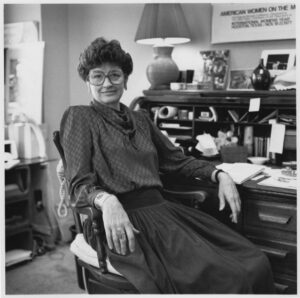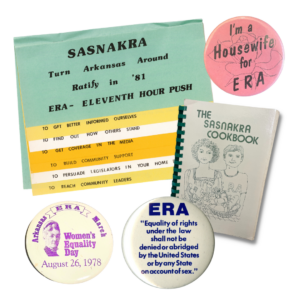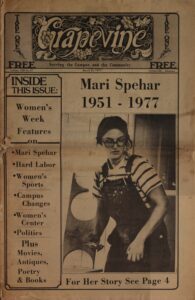calsfoundation@cals.org
Women’s Equality in Arkansas
Women’s Equality Day is observed in the United States each year on August 26 to recognize the day in 1920 that the Nineteenth Amendment to the U.S. Constitution was officially certified and became law, guaranteeing women the right the vote. In 1971, Representative Bella Abzug of New York championed a bill in the U.S. Congress to designate August 26 as “Women’s Equality Day.”
The resolution reads as follows:
Joint Resolution of Congress, 1971 Designating August 26 of each year as Women’s Equality Day
WHEREAS, the women of the United States have been treated as second-class citizens and have not been entitled the full rights and privileges, public or private, legal or institutional, which are available to male citizens of the United States;
and WHEREAS, the women of the United States have united to assure that these rights and privileges are available to all citizens equally regardless of sex;
and WHEREAS, the women of the United States have designated August 26, the anniversary date of the certification of the Nineteenth Amendment, as symbol of the continued fight for equal rights;
and WHEREAS, the women of United States are to be commended and supported in their organizations and activities,
NOW, THEREFORE, BE IT RESOLVED, the Senate and House of Representatives of the United States of America in Congress assembled, that August 26th of each year is designated as Women’s Equality Day, and the President is authorized and requested to issue a proclamation annually in commemoration of that day in 1920, on which the women of America were first given the right to vote, and that day in 1970, on which a nationwide demonstration for women’s rights took place.
This was one of many steps women in Congress, state legislatures, and local governments took beginning in the 1960s to spotlight women’s inequality and advocate for measures to further their legal and societal equality. This era of political activity is known as “second-wave feminism.”
In Arkansas, many groups took part in second-wave feminist political organizing. The CALS Butler Center for Arkansas Studies has several collections that document this activity in the state.

longstanding collections that document this period of feminist activism include the Brownie Ledbetter papers (BC.MSS.99.36). Mary Brown Williams “Brownie” Ledbetter helped to organize ERArkansas and other women’s groups during the period. She supported the ratification of the ERA and other women’s issues during the period. Her papers include material from a variety of second-wave feminist organizations including ERArkansas, the Panel of American Women (which later became the Arkansas Public Policy Panel), and the Arkansas Women’s Political Caucus. The collection contains many organizational materials from these groups and Ledbetter’s personal political activities from the period.
To increase the visibility of these collections that document an underrepresented group and time in Arkansas’s history, the Butler Center has recently processed two collections related to second-wave feminism.
First, the Marie Jordan political collection (BC.MSS.19.21) documents the activities of Methodist political activist Marie Jordan, who worked to improve rights for women within the Methodist Church and society. Through the late 1970s and early 1980s, Jordan specifically focused on work with ERArkansas, an organizing group that was formed in 1972 to advocate for state ratification of the Equal Rights Amendment (ERA). Jordan’s collection primarily documents the SASNAKRA campaign, which ERArkansas coordinated as a final push to “turn Arkansas around” on ratifying the ERA. Their efforts were never successful.

In 1978, ERArkansas hosted a march and rally on Women’s Equality Day to raise awareness for the holiday and further push for ratification of the ERA. The group operated until 1981 and was briefly revived in the early 2000s. Efforts to ratify the ERA since the 1970s have faced barriers at the state and national level. The Arkansas Legislature has never ratified the ERA. The collection contains a large quantity of political ephemera from the period.
Second, the recently processed Lee Cowan newspaper collection (BC.MSS.23.05) contains three newspapers that document feminism in Arkansas in the late 1970s. Issues discussed include women’s health, violence against women, the Equal Rights Amendment, labor issues, and lesbian rights.
Hard Labor was a newspaper published between 1975 and 1979 by the Feminist Press Collective in Fayetteville, Arkansas. The publication featured articles on feminist and lesbian issues, interviews with local activists, and ads for businesses in the Fayetteville and Eureka Springs areas. It changed its name to the Ozark Feminist in 1980. Publication ceased entirely after that year.
Ours was a newspaper published between 1978 and 1987 in Little Rock; the creators called themselves “A Feminist News Collective” and stated in their pages that they operated collectively. The newspaper featured articles on women’s issues in the period and information on women’s organizations in central Arkansas.

The Grapevine was an alternative newspaper published in Fayetteville by the Arkansas Student Free Press Association from 1970 to 1993. The paper published articles on topics that were not covered by the mainstream media, often dealing with feminism, sexuality, and women’s health. The issue pictured here featured an article on the death of Mari Sephar (1951–1977), a local feminist who died from complications related to a contraceptive device.
Together, these collections give us a glimpse into past generations’ efforts to lobby for women’s equality in Arkansas. Many of these efforts began with the organizing efforts of women like Marie Jordan and Brownie Ledbetter. This year, we can spend Women’s Equality Day thinking about their contributions and the contributions of others working for a more equitable society.
***
Come visit us in the Research Room of the Bobby L. Roberts Library of Arkansas History & Art to learn about these resources and countless others. The 1st floor of the Roberts Library will be serving as “Mini Main” during renovations to the CALS Main Library, which is closing to the public on Sept. 1 (more info. here), but the Research Room on the 2nd floor of Roberts will remain open and available to researchers.
By Danielle Afsordeh, Community Outreach Archivist at the CALS Roberts Library/Butler Center for Arkansas Studies




